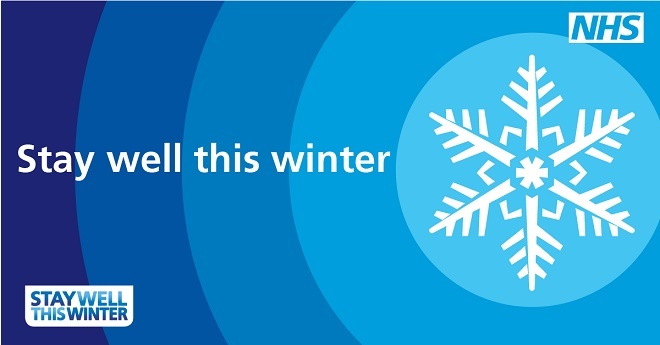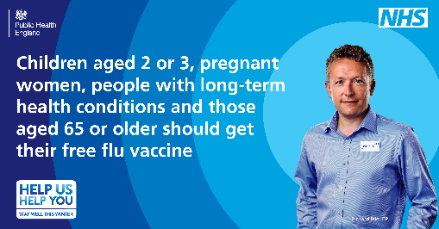Advice about staying safe and well in cold spells
Shropshire Council’s public health team are reminding residents across the county to keep warm and well during cold spells.
The council’s ‘Stay safe and well this winter’ website offers a range of advice and information, from helping vulnerable people to remain safe and well, to notifications of school closures and travel updates.

Help Us Help You
The website signposts people to a wide range of both local and national winter-related information which includes:
- Stay well this winter, Public Health England and NHS advice – to help those people who are most at risk of illness during winter to take steps to stay well, including make sure you get your flu jab. Pharmacies offer flu vaccinations in Shropshire.
- Local information during bad weather– updates and information on traffic, winter road maintenance, road and school closures, what to do if your waste is not collected and services effected by adverse weather.
- Keep well and warm– Government advice on staying well in cold weather, covering issues such as financial help, healthy lifestyle and heating.
- Get Ready for Winter– Met Office advice and information of the dangers posed by winter weather and provide tips and advice on how to minimise its impact.
- Winter advice for older people– advice and information from Age UK.
- Shropshire Newsroom– news and updates from Shropshire Council.
- Rough sleepers – advice on how to let us know if you see someone rough sleeping.
Spells of cold weather can put older people, those with underlying health conditions and young children, at risk from a range of conditions, because cold weather forces their bodies to work much harder than usual.

Stay well this winter
Rob Gittins, Shropshire Council’s deputy Cabinet member for public health, said:-
“Shropshire Council’s ‘stay safe and well’ pages are designed to help residents in Shropshire remain well throughout the winter period.
“Much of this advice is common sense but it’s always worth making the point, as there are many people out there, the very young and very old and those with underlying health conditions, such as asthma and heart disease, and those who sleep rough, who will feel the effects of cold weather more than others. This is why we issue these warnings, so that people think about what activities are appropriate for them and their situation.
“We therefore urge people to take practical steps such as to wrap up warm before the temperature dial hits freezing, so I’d really encourage everyone to view our stay safe and well pages, which offer invaluable advice and tips, as well as useful contacts, on keeping safe and well.”
The public health team are also urging those eligible for a free flu vaccine to take up their flu jab in particularly those with long term health conditions, pregnant women and children aged 2 and 3.

Free flu vaccination
It’s not too late to vaccinate
Rachel Robinson Shropshire Council’s director of public health, added:
“It’s really important for those who are eligible* to take up their free flu jab to do so now, especially if you have an underlying health condition such as asthma, diabetes or chest/heart condition etc.
“The vaccine is the best defence we have against the spread of flu, and it isn’t too late to get vaccinated.”
Top tips to prepare for colder weather:-
- look out for friends and family who may be vulnerable to the cold, and ensure they have access to warm food and drinks and are managing to heat their homes adequately
- try to maintain indoor temperatures to at least 18°C, particularly if you are not mobile, have a long-term illness or are 65 or over
- stay tuned for weather forecasts, ensure you are stocked with food and medications in advance, have deliveries, or ask a friend to help
- take weather into account when planning your activity over the following days
- if eligible, seek entitlements and benefits – power and utility companies have schemes which make at-risk groups a priority for reconnection following power cuts
- avoid exposing yourself to cold or icy outdoor conditions if you are at a higher risk of cold-related illness or falls.
Help with heating and making your home more energy efficient
Our Keep Shropshire Warm Scheme offers free and impartial advice on grants and discounts to help warm your home and or make it more energy efficient. For more information visit about Keep Shropshire Warm visit https://www.shropshire.gov.uk/private-sector-housing/keep-shropshire-warm-energy-saving-advice/
To find out more on how to stay safe and well this winter, visit www.shropshire.gov.uk/stay-safe-and-well-this-winter/
Further information
More winter health and wellbeing advice
Keeping you home warm, efficient and safe:-
Heating your home to at least 18C in winter poses minimal risk to your health when you are wearing suitable clothing.
- Heating your home to at least 18C is particularly important if you have reduced mobility, are 65 and over, or have a health condition, such as heart or lung disease. Having room temperatures slightly over 18C could be good for your health.
- If you are under 65, active and wearing appropriate clothing, you may feel comfortable at room temperatures slightly lower than 18C.
- Overnight, people who are 65 and over or who have pre-existing health conditions, may find bedroom temperatures of at least 18C are good for their health; this may be less important if you are a healthy adult under 65 and have appropriate clothing and bedding.
- If you can’t heat all the rooms you use, heat the living room during the day and your bedroom just before you go to sleep.
- Get your heating system and cooking appliances checked and keep your home well ventilated.
- If you have an electric blanket, use it as instructed and get it tested every three years. Never use a hot water bottle with an electric blanket.
- Do not use a gas cooker or oven to heat your home; it is inefficient and there is a risk of carbon monoxide poisoning which can kill.
- If you are not on mains gas or electricity make sure you have a supply of heating oil, LPG or solid fuel so you do not run out in winter.
Look after yourself:
- Keeping well will allow you to do more and keep your independence. Being cold isn’t just uncomfortable it can be bad for your health. Sitting or sleeping in a cold room is not good for you and increases the risk of heart attacks, stroke and breathing problems. Don’t let the cold catch you out – check the weather forecast and be ready for cold weather.
- Keep your bedroom windows closed on a winter’s night; breathing cold air can increase the risk of chest infections.
- Exercise is good for you all year round and it can keep you warm in winter.
- Keep moving if you can, this will help keep you warm. Try not to sit for more than an hour – get up and walk around, make a hot drink and spread housework throughout the day. If walking is a problem try moving your arms and legs whilst sitting or wiggling your fingers and toes.
- Wear a few layers of thin clothing rather than one thick layer; this will trap the heat better to keep you warm. Thin layers of clothes made from cotton, wool or fleecy fibres are particularly good and maintain body heat.
- Wear shoes with a good grip to prevent slips and falls. Make sure you have spare medication in case you are unable to go out.
- Food is a vital source of energy and helps to keep your body warm so have plenty of hot food and drinks.
- Aim to include five daily portions of fruit and vegetables. Tinned and frozen vegetables count towards your five a day.
- Stock up on tinned and frozen foods so you don’t have to go out too much when it’s cold or icy.
- Power and utility companies have schemes which make at-risk groups a priority for reconnection following power cuts. Find out if you meet the criteria and if so, sign up. Visit https://www.ofgem.gov.uk/consumers/household-gas-and-electricity-guide/extra-help-energy-services/priority-services-register-people-need for more information
Look after others:
- Check on frail or older neighbours or relatives, especially those living alone or who have serious illnesses to make sure they are safe, warm and well.
- All of the advice for looking after yourself can be used to plan how to help others.
- Those with care responsibilities, whether that’s for family members or on a professional or voluntary basis, should consult the Cold Weather Plan for England for a range of useful advice as well as ensuring that those at risk have homes heated to at least 18C and receive regular visitors.
- In advance of winter, carers should be aware of how to refer to local housing and health referral services if further support is required.
- Charities, social and health care organisations should ensure that carers of those most at-risk are getting the support and advice they need to protect those who may be vulnerable to the ill-effects of cold weather.
Keep the warmth in by:
- Fitting draught proofing to seal any gaps around windows and doors.
- Making sure you have loft insulation. And if you have cavity walls, make sure they are insulated too.
- Insulate your hot water cylinder and pipes.
- Draw your curtains at dusk and tuck behind radiators to help keep heat inside.
- Make sure your radiators are not obstructed by furniture or curtains.
Get financial help:
- There are grants, benefits and advice to help make your home more energy efficient, improve your heating or help with bills. It’s worthwhile claiming all the benefits you are entitled to before winter sets in.

